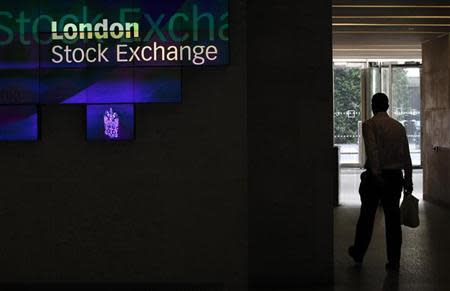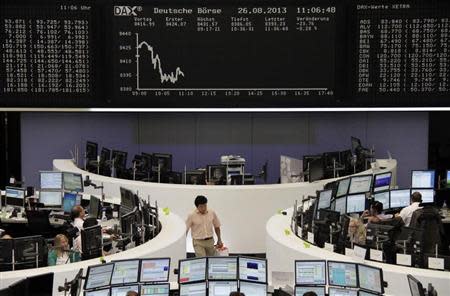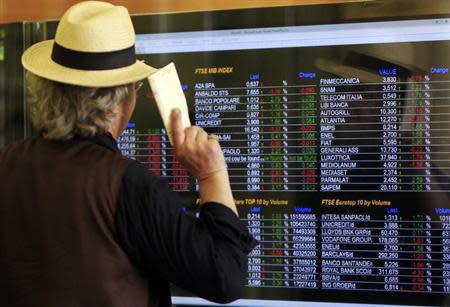U.S. stocks down, yields ease, dollar rises
By Ellen Freilich NEW YORK (Reuters) - Uncertainty about a potential cut in Federal Reserve stimulus kept global equity markets under pressure on Wednesday as U.S. yields eased and the dollar rose. Wall Street followed overseas markets lower, with concerns the Fed could start to scale back its stimulus efforts damping investors' appetite for risky assets. The Dow Jones industrial average was down 49.83 points, or 0.32 percent, at 15,700.84. The Standard & Poor's 500 Index was down 1.09 points, or 0.06 percent, at 1,766.60. The Nasdaq Composite Index was up 0.72 points, or 0.02 percent, at 3,920.64. "What we are seeing time and time again is a respite after a strong market charge. This pattern of stair-stepping to all-time highs is now being countered with some profit-taking and conservative portfolio management, especially ahead of the Yellen confirmation," said Andre Bakhos, managing director at Janlyn Capital LLC in Bernardsville, New Jersey, referring to Janet Yellen's scheduled appearance Thursday before the Senate Banking Committee. President Barack Obama has nominated Yellen to succeed Fed Chairman Ben Bernanke when Bernanke's term expires in January. Doubts about the euro zone's recovery and the lifespan of Britain's record low interest rates hurt stock prices there and in the euro zone. Britain's FTSE took its biggest fall in over a month and Europe's FTSEurofirst tumbled for a second day as signs of a strengthening UK economy but worse-than-expected euro zone factory data hit markets from opposing sides. Investors have been buying U.S. and European assets in recent months on the view that both regions' economies are recovering, but not strongly enough to let central banks reduce stimulus. Diverging signals from Britain and the euro zone dealt both assumptions a glancing blow. Euro zone September industrial production fell slightly short of analysts' forecasts. While BoE head Mark Carney stressed that his bank has no plans to raise UK rates, a huge upward revision to the BoE's jobs outlook left markets wondering whether he could fulfill that promise. U.S. Treasuries prices rose and the benchmark 10-year Treasury note was up 9/32 to yield 2.734 percent. The Treasury will sell $24 billion sale of 10-year debt on Wednesday and hold a $16 billion auction of 30-year bonds on Thursday The dollar, meanwhile, rose against the euro in a lackluster session, with investors continuing to trade on comments from a Fed official that seemed to keep the door open to a first drawdown in stimulus next month. Atlanta Fed President Dennis Lockhart, seen as a policy centrist, said on Tuesday that a cut in the Fed's bond-buying operations remained a possibility in December. But he also said last month's U.S. government shutdown cast some doubt on the reliability of economic data through December, one reason not to expect policy change at the Fed's next meeting in December. The euro fell to $1.3428, off 0.1 percent on the day, dragged down partly by its losses against the pound but holding above the two-month low of $1.3295 struck after Thursday's ECB rate cut. The euro was also hurt by more evidence of falling price pressures in the euro zone, reinforcing concerns about easing inflation that led the ECB to cut rates last week. Data on Wednesday showed Spanish prices fell for the first time in four years in October. "The Spanish inflation numbers were slightly below their earlier reading, which tells you that the ECB will have to take fresh easing measures," said Alvin Tan, currency strategist at Societe Generale in London. "Having said that, we do not expect the euro to fall sharply against the dollar unless we get more signs that the Fed will start to taper. For that, Yellen's confirmation hearings will be important for near-term direction in the dollar," Tan said. The dollar eased 0.2 percent to 99.44 yen, not far from a two-month high of 99.79 yen struck on Tuesday. The U.S. currency is up about 0.4 percent so far this week against the yen, having drawn strength from rising U.S. bond yields. Higher U.S. bond yields tend to favor the dollar by making dollar-denominated debt more attractive to bond investors. Regular hostages to the U.S. stimulus program, the Indian rupee and the Indonesian rupiah, stabilized in European trading but were still hurting. MSCI's emerging market index lost about 1.3 percent as it notched its 10th straight session of falls and hit its lowest levels since mid-September. In commodities markets, gold stood at $1,272.76 an ounce. U.S. crude for December delivery rose 59 cents to $93.63 a barrel after flirting with 4-1/2 month lows, while Brent gained 95 cents to $106.76. Oil was helped as supply outages countered concerns about reduced U.S. monetary stimulus and a forecast rise in U.S. stockpiles. (Additional reporting by Marc Jones in London and Richard Leong, Nick Olivari and Angela Moon in New York; Editing by Dan Grebler)









